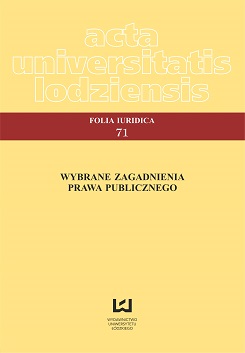O potrzebie ujednolicania norm prawa ochrony środowiska
ABOUT THE NEED TO STANDARIZE THE NOR MS OF LA W OF THE ENVIRONMENT PROTECTION
Author(s): Piotr KorzeniowskiSubject(s): Law, Constitution, Jurisprudence, Environmental interactions
Published by: Wydawnictwo Uniwersytetu Łódzkiego
Summary/Abstract: The text is intended for use by attorneys, government and private-sector personnel who are actively involved in environmental protection, academicians, and others interested in environmental issues. Standardization is defined as best technical application consensual wisdom inclusive of processes for selection in making appropriate choices for ratification coupled with consistent decisions for maintaining obtained standards. The standards applicable to each sector of the environment. When the European Community sets standards for environmental protection, these do not prevent the “progressive” member states from maintaining or introducing more stringent environmental protection measures. Even if the European Community has adopted protective measures, i.e. set certain environmental standards pursuant to Standardization or standardisation is the process of developing and agreeing upon technical standards. A standard is a document that establishes uniform engineering or technical specifications, criteria, methods, processes, or practices. Some standards are mandatory while others are voluntary. Voluntary standards are available if one chooses to use them. Some are de facto standards, meaning a norm or requirement which has an informal but dominant status. Some standards are de jure, meaning formal legal requirements. Formal standards organizations, such as the International Organization for Standardization (ISO) or the American National Standards Institute, are independent of the manufacturers of the goods for which they publish standards. The goals of standardization can be to help with independence of single suppliers (commoditization), compatibility, interoperability, safety, repeatability, or quality. In social sciences, including economics, the idea of standardization is close to the solution for a coordination problem, a situation in which all parties can realize mutual gains, but only by making mutually consistent decisions. Standardization is defined as best technical application consentual wisdom inclusive of processes for selection in making appropriate choices for ratification coupled with consistent decisions for maintaining obtained standards. The ISO 14000 is a standard for environmental management systems that is applicable to any business, regardless of size, location or income. The aim of the standard is to reduce the environmental footprint of a business and to decrease the pollution and waste a business produces. The most recent version of ISO 14001 was released in 2004 by the International Organization for Standardization (ISO) which has representation from committees all over the world. The ISO 14000 environmental management standards exist to help organizations minimize how their operations negatively affect the environment. Environmental standards is a set of quality conditions that are to be adhared or maintained for a particular environmental component and function. the different environmental activities have different concerns and therefore different standards. The text provides a general overview of why and how the international system elaborates environmental obligations and monitors compliance with them. Second, it discusses the relationship between international obligations and national and local law, with particular reference to federal systems. It indicates another interrelationship, pointing out the influence national law has on the emergence of international law as well as the growing role of international norms in the development and enforcement of national and local environmental policies. Finally, it examines the extent to which environmental protection should be and is taken into account in other regulatory frameworks, from trade law and human rights to disarmament and refugee policy. The basic knowledge provided in this text should allow the reader to undertake further research on topics of environmental regulation at the international level and to understand the implications of international environmental law for national law and policy. In social sciences, including economics, the idea of standardization is close to the solution for a coordination problem, a situation in which all parties can realize mutual gains, but only by making mutually consistent decisions. In almost all fields in european environmental law, the use of standards and thresholds is commonly practiced. Therefore a selection is necessary, and the topic will be discussed with particular reference to the more European influenced Emission Control Law and the typical national sector of Soil Protection Law. European standardisation offers great potential to advance the protection of our environment.
Journal: Acta Universitatis Lodziensis. Folia Iuridica
- Issue Year: 2012
- Issue No: 71
- Page Range: 35-54
- Page Count: 20
- Language: Polish

